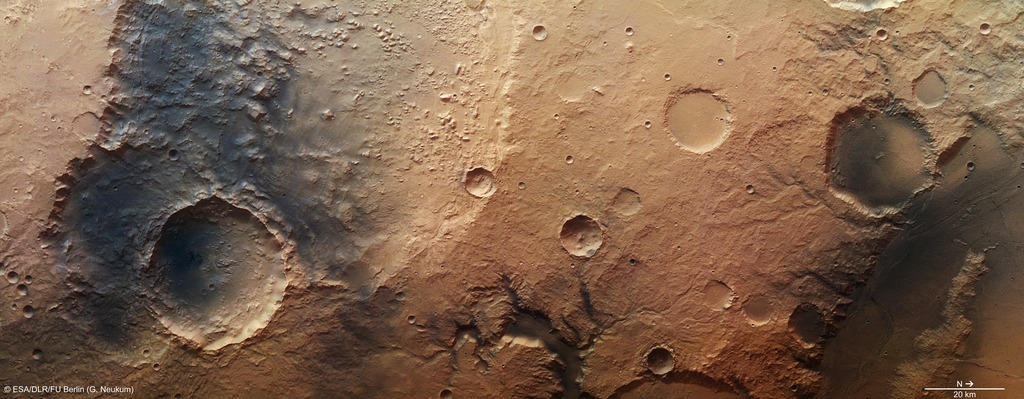The Helmholtz Alliance "Planetary Evolution and Life"
Helmholtz Association under the auspices of the German Aerospace Centre (DLR).
Reference number: HA20-3
The Helmholtz Alliance “Planetary Evolution and Life” under the coordinative direction of the DLR Institute of Planetary Research in Berlin-Adlershof examines the correlation between life and the formation and evolution of planets in our solar system. The focus of studies is planet Mars, which is investigated from its interior to its atmosphere.
Martian surface with craters in the region Hesperia Planum
The research alliance investigates the interaction between atmosphere and biosphere, interactions inside the atmosphere, the planetary magnetic field, impact events, climate evolution as well as developments of strategies for the exploration of other planets. Several institutions are significantly involved in this alliance: Along with the DLR these are the Alfred-Wegener-Institute in Potsdam, the Technical University of Berlin (TU), the Humboldt-University of Berlin (HU), the Max Planck Institutes for Biogeochemistry and Solar System Research, the Yale University (USA) and several others.
Mobility of substances and material cycles are the geological prerequisites for the evolution of life on a planet. Planetary surfaces are the contact area between the solid planetary body and its atmosphere. The planetary surface and near-surface structures are well accessible for investigations and provide information about the current condition as well as about the planets evolution in the past. To recognize possible material cycles and mobility of substances it is important to understand coherences and interactions between lithosphere and atmosphere and to compare information about the current condition with older structures.
The Planetary Sciences and Remote Sensing Group was directly involved in the Helmholtz Alliance with research projects under the leadership of Prof. Neukum (April 2008 to March 2012) and Prof. van Gasselt (April 2012 to March 2013) respectively. The research topic “Geological Context of Life” formed the key activities of the research group. Here, especially work on age determination of planetary surfaces was performed:
- investigations concerning the relative stratigraphy
- absolute age determination by crater counting
- assessment of the duration of geological processes
- stability of environmental conditions
